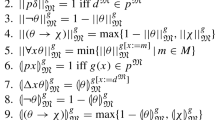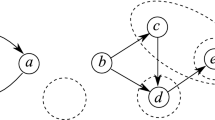Abstract
The constraint satisfaction problem (CSP) is a convenient framework for modelling search problems; the CSP involves deciding, given a set of constraints on variables, whether or not there is an assignment to the variables satisfying all of the constraints. This paper is concerned with the more general framework of quantified constraint satisfaction, in which variables can be quantified both universally and existentially. We study the relatively quantified constraint satisfaction problem (RQCSP), in which the values for each individual variable can be arbitrarily restricted. We give a complete complexity classification of the cases of the RQCSP where the types of constraints that may appear are specified by a constraint language.
Similar content being viewed by others
References
Böhler, E., Creignou, N., Reith, S., & Vollmer, H. (2004). Playing with boolean blocks, part II: Constraint satisfaction problems. ACM SIGACT-Newsletter, 35(1), 22–35.
Börner, F., Bulatov, A., Krokhin, A., & Jeavons, P. (2003). Quantified constraints: Algorithms and complexity. In Computer Science Logic 2003.
Bulatov, A. (2003). Tractable conservative constraint satisfaction problems. In Proceedings of 18th IEEE symposium on logic in computer science (LICS ’03) pp. 321–330. Extended version appears as Oxford University technical report PRG-RR–03-01.
Bulatov, A. A. (2006). A dichotomy theorem for constraint satisfaction problems on a 3-element set. Journal of the ACM (JACM), 53, 66–120.
Bulatov, A., & Dalmau, V. (2006). A simple algorithm for mal’tsev constraints. SIAM Journal of Computing, 36(1), 16–27.
Bulatov, A., Chen, H., & Dalmau, V. (2004). Learnability of relatively quantified generalized formulas. In Proceedings of the 15th international conference on algorithmic learning theory (ALT).
Bulatov, A., Krokhin, A., & Jeavons, P. (2000). Constraint satisfaction problems and finite algebras. In Proceedings 27th international colloquium on automata, languages, and programming – ICALP’00, Lecture Notes In Computer Science (Vol. 1853, pp. 272–282)
Chen, H. (2004). The computational complexity of quantified constraint satisfaction. Technical Report Ph.D. thesis, Cornell University. http://www.tecn.upf.es/~hchen.
Chen, H. (2005). Quantified constraint satisfaction, maximal constraint languages, and symmetric polymorphisms. In STACS.
Chen, H. (2006). The complexity of quantified constraint satisfaction: Collapsibility, sink algebras, and the three-element case. arxiv cs.LO/0607106.
Creignou, N., Khanna, S., & Sudan, M. (2001). Complexity classification of boolean constraint satisfaction problems. SIAM Monographs on Discrete Mathematics and Applications. Philadelphia: Society for Industrial and Applied Mathematics.
Dalmau, V. (1997). Some dichotomy theorems on constant-free quantified boolean formulas. Technical Report LSI-97-43-R, Llenguatges i Sistemes Informàtics - Universitat Politècnica de Catalunya.
Dalmau, V., & Pearson, J. (1999). Closure functions and width 1 problems. In CP 1999, pp. 159–173.
Feder, T., & Kolaitis, P. (2006). Closures and dichotomies for quantified constraints. Electronic Colloquium on Computational Complexity, Report TR06-160.
Feder, T., & Vardi, M. Y. (1998). The computational structure of monotone monadic snp and constraint satisfaction: A study through datalog and group theory. SIAM Journal of Computation, 28(1), 57–104.
Jeavons, P. (1998). On the algebraic structure of combinatorial problems. Theoretical Computer Science, 200, 185–204.
Jeavons, P., Cohen, D., & Cooper, M. (1998). Constraints, consistency, and closure. Artificial Intelligence, 101(1–2), 251–265.
Jeavons, P. G., Cohen, D. A., & Gyssens, M. (1997). Closure properties of constraints. Journal of the ACM, 44, 527–548.
Krokhin, A., Bulatov, A., & Jeavons, P. (2005). The complexity of constraint satisfaction: An algebraic approach. Heidelberg: Springer.
Martin, B., & Madelaine, F. (2006). Towards a trichotomy for quantified H-coloring. In Logical approaches to computational barriers, second conference on computability in Europe, lecture notes in computer science. Springer.
Pöschel, R., & Kaluz̆nin, L. A. (1979). Funktionen- und Relationenalgebren. Boston: Birkhäuser.
Schaefer, T. J. (1978). The complexity of satisfiability problems. In Proceedings of the ACM symposium on theory of computing (STOC), pp. 216–226.
Author information
Authors and Affiliations
Corresponding author
Rights and permissions
About this article
Cite this article
Bodirsky, M., Chen, H. Relatively quantified constraint satisfaction. Constraints 14, 3–15 (2009). https://doi.org/10.1007/s10601-008-9054-z
Published:
Issue Date:
DOI: https://doi.org/10.1007/s10601-008-9054-z




